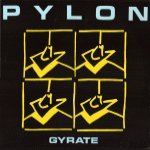
Pylon Gyrate Plus
(DFA)
Oblivious to what I was asking for, I solicited a promo from DFA for an album by an artist named Pylon called Gyrate Plus, trusting the high quality control of the dancerock heroes, figuring I would get some sweaty post-Industrial party music or a hypercool techno concoction. It turns out that Gyrate Plus is a first time on CD re-issue of an unjustly overlooked kickass rock and roll classic. Apparently, Pylon were one of the more amazing new things in the post-punk climate of 1980, churning out inimitably jagged, sparse, rhythmic jams that link them to emergent British phenomenons like Gang of Four as well as the No Wave provocateurs that were haunting New York at the time. Meanwhile, they were pillars (pylons, if you will) of the Athens, GA college rock scene that was in the process of launching contemporaries and admirers like the B-52s and REM, laying the groundwork for a community that continues to thrive, birthing indie icons like Neutral Milk Hotel and the whole Elephant 6 pop clusterfuck.
Namedropping aside (just for this sentence really), Gyrate Plus is an amazing record that has been unjustly forgotten despite an intimidating cult of prominent proponents, and it is richly deserving of all the attention an album release on DFA warrants. Their fingerprints can be felt all over the better American college rock of the 80s, particularly in dark, insistent bass lines and clean, subtly infectious guitar strums that REM clearly had quite an ear for. Where that band carried these sounds into Byrdsian jangle and harmony, Pylon keeps their attention here strictly on the driving rhythm that makes the whole thing constantly danceable and isolates all the instruments into short, repetitive stabs. The best tracks, like the indispensable (now that I've heard it) Stop It and the intoxicatingly flanged Danger, create a hypnotic, pleasantly abrasive groove that makes it no wonder their live shows were legendary (they are said to re-unite occasionally, working together on what I would call the Terrence Malick timeline).
Where Michael Stipe, at least in the 80s, delivered beautiful, lingering, and mostly mumbled poetics, Vanessa Hay adopted the other art school schtick to attracting attention to her obscure word collages, that is sharp, insistent proclamations, ranging from a firm whisper to a piercing shriek, and capable of going from one to the other in a few seconds in a style that has infected generations of indie character vocalists. The Information Age and this interweb we love so damn much have created a climate of hyperawareness of the past and confusion about what marks the present and future. What that particularly pretentious and semi-coherent statement is trying to get across is that Pylon and Gyrate Plus simultaneously feel like time capsules or lost treasures and music as modern and relevant as anything I've danced to recently. The DFA has done a great favour with this excavation.
5 November, 2007 - 22:37 — George Booker